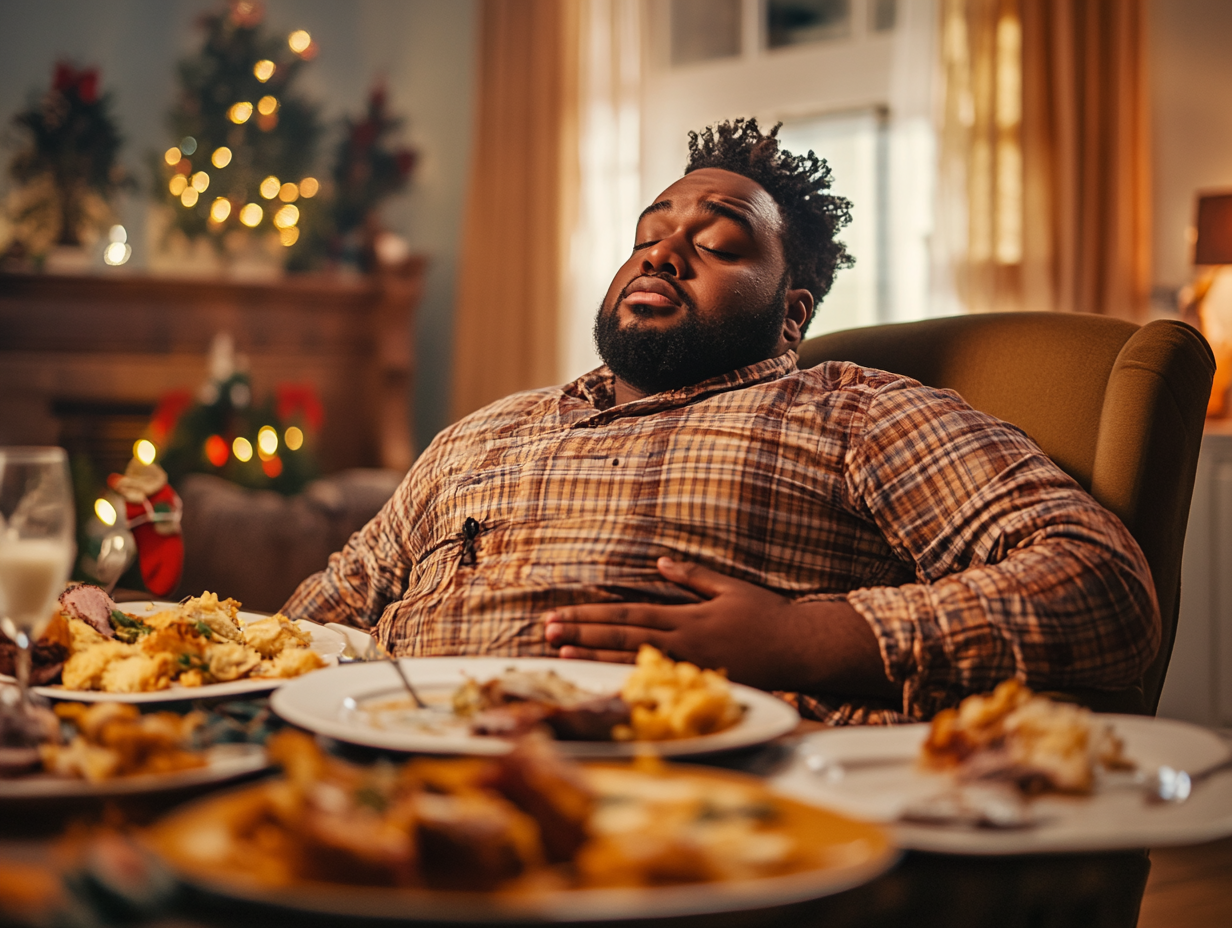1. The Legendary Food Coma Takes Over
Let’s be real – the food coma is the ultimate Thanksgiving tradition. One moment you’re sitting at the table, proudly surveying your plate of culinary conquests, and the next, you’re sinking into the nearest couch like a human-shaped potato. Your body goes into full shutdown mode, redirecting all available energy to digestion. Goodbye, productivity. Hello, horizontal lifestyle.
The science behind this phenomenon is actually pretty fascinating. When you overeat, your body sends more blood to your digestive system, which means less blood flow to your brain and muscles. The result? A complete system slowdown that makes moving feel like an Olympic-level challenge. Pro tip: Those family members who mysteriously disappear after dinner? They’re not antisocial – they’re just deep in the food coma zone.
2. Your Digestive System Declares War
Thanksgiving isn’t just a meal; it’s a full-blown digestive challenge. When you push your stomach beyond its limits, your body responds with a symphony of uncomfortable reactions. Bloating becomes your new body shape, and gas transforms you into a walking (or more accurately, sitting) biological weapon.
The combination of rich foods, massive portions, and potentially competing flavors creates a perfect storm in your digestive tract. Expect some serious rumbling, potential heartburn, and a newfound appreciation for elastic waistbands. Your stomach will be working overtime, processing everything from turkey and stuffing to pie and more pie.
3. Metabolism Goes into Overdrive
Surprisingly, your body doesn’t just surrender after an epic feast. Your metabolism kicks into high gear, working frantically to process the massive calorie intake. This metabolic marathon can actually cause a temporary boost in your metabolic rate, which might sound like good news – but it comes with its own set of challenges.
You’ll likely experience increased body temperature, potential sweating, and a feeling of being simultaneously stuffed and weirdly energetic. It’s like your body is running a marathon while being stuck in a sumo wrestler’s outfit. The internal workout is real, even if you’re not moving an inch.
4. Sleep Becomes a Complex Negotiation
Think falling asleep will be easy after your feast? Think again. Overeating disrupts your normal sleep patterns in ways you never expected. The combination of high-calorie foods, increased body temperature, and digestive overload can lead to restless nights and bizarre dreams.
Your body is essentially battling between the need to rest and the complex process of digestion. You might find yourself tossing and turning, experiencing indigestion, and feeling both exhausted and uncomfortably full. Pro survival tip: Sleeping slightly elevated can help manage some of these discomforts.
5. Emotional Rollercoaster Begins
Overeating isn’t just a physical experience – it’s an emotional journey. The initial euphoria of the feast quickly transforms into a complex mix of satisfaction, regret, and mild self-loathing. One moment you’re basking in the glory of your culinary achievements, and the next, you’re questioning every life choice that led to this moment.
The hormonal and chemical changes triggered by massive food consumption can actually impact your mood. Insulin spikes, sugar crashes, and the body’s stress response can leave you feeling alternatively elated, exhausted, and emotionally vulnerable. It’s like a psychological theme park ride, minus the fun.
6. Hydration Becomes Your New Obsession
After the feast, water becomes more precious than gold. Your body desperately needs hydration to help process the massive food intake. You’ll find yourself chugging water like it’s going out of style, trying to help your digestive system navigate the culinary obstacle course you’ve just created.
The salt, sugar, and complex carbohydrates consumed during Thanksgiving create a perfect storm of dehydration. Your body will be sending urgent signals for fluid replacement, turning you into a walking water bottle. Prepare for multiple bathroom trips and an intimate relationship with your water glass.
7. Metabolism Shifts Into Recovery Mode
In the days following your Thanksgiving feast, your metabolism enters a fascinating recovery phase. Your body becomes incredibly efficient at processing nutrients, potentially storing some extra energy for future use. Translation: Those extra pounds aren’t just a temporary souvenir.
This metabolic adaptation can actually impact your eating patterns and energy levels for several days. You might experience fluctuating hunger signals, changes in energy levels, and a body that’s working hard to return to its baseline state.
Survival Guide: Navigating Post-Feast Challenges
While overindulgence is part of the Thanksgiving tradition, there are ways to minimize the aftermath:
- Stay hydrated
- Take a gentle walk after the meal
- Avoid immediate intense exercise
- Listen to your body’s hunger and fullness signals
- Practice gentle stretching
- Get adequate sleep
The Silver Lining
Despite the potential discomfort, Thanksgiving overeating is a cherished tradition. It’s about more than just food – it’s about connection, family, and creating memories. So embrace the food coma, laugh about the digestive drama, and remember: elastic waistbands exist for a reason.
Just maybe keep some antacids nearby, just in case.






